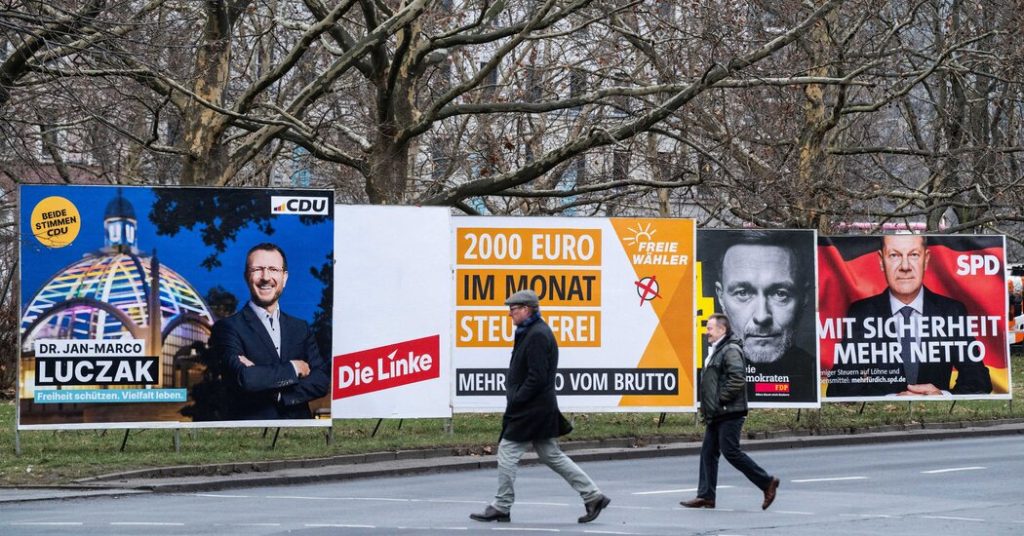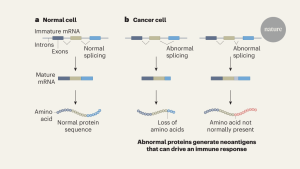Germans vote on Sunday in a rare snap election that has taken on outsized importance as the new Trump administration threatens European countries with tariffs, cuts them out of negotiations over Ukraine, and embraces an authoritarian Russia.
The election for Parliament was called after Chancellor Olaf Scholz’s unpopular and long-troubled three-party government collapsed in November. Seven months earlier than scheduled, the voting now falls in the midst of Europe’s struggle for strong leadership and as it recalibrates its relationship with the United States.
Despite the effort by politicians and countless volunteers to bring excitement to the race during the short, dark winter campaign, polls never much shifted. Friedrich Merz and his conservative Christian Democratic Union have a comfortable lead.
The hard-right Alternative for Germany, or AfD, is expected to place second, riding on voter dissatisfaction with mainstream parties and fears of migration. Polls show it is likely to have its best showing ever.
Chancellor Scholz’s Social Democrats, which eked out a victory in 2021, are expected to come in third, just ahead of the Greens. The Social Democratic party, the oldest party in Germany, may be poised for its worst showing since it was banned by the Nazis.
But uncertainties abound. Here are some things to watch for:
Two’s Company, Three’s a Crowd
No party is expected to get enough votes to govern alone and outright. The most important question will then be how many parties are needed to form a government.
Together Mr. Merz’s center-right Christian Democrats and the far-right AfD are likely to have the broadest majority. But because the AfD is tainted by neo-Nazi associations, Mr. Merz and all mainstream party leaders say they will not form a government with it. Instead they will join together in what’s called the “firewall,” aimed at keeping extremists out of power.
That leaves the Social Democrats, though they are on the center-left, as Mr. Metz’s most likely partner. If the two of them don’t have enough support to form a majority, a third party will be needed.
The experience of the incumbent government showed just how difficult and unstable a three-party group can be. It’s an outcome that many analyst say would leave Germany almost back to when the last three-party government collapsed.
Little Kingmakers
It will be critically important, then, how well smaller parties will do and whether they get at least the five percent support needed to enter Parliament.
If polling is correct, the tiny Die Linke party, on the far left, seems likely to make it. Polls show it poised for a turnaround from last year when it appeared to be on its way to extinction after one of its most popular members, Sahra Wagenknecht, broke from it to form her own party.
The Sahra Wagenknecht Alliance, or BSW, as the new party is called, is running for the first time at a national level. Its prospects are uncertain.
Another party hovering near the threshold is the pro-business Free Democratic Party. Its leader, Christian Lindner, is the man who goaded Chancellor Scholz into kicking him out of the government, precipitating Sunday’s election. For him, the vote will be a test of whether that gambit to save his party pays off.
For all these parties, clearing the barrier to entering Parliament is an existential question; without seats in Parliament, they are much less visible and have access to much less funding.
But if they all make it into the Parliament, that is likely to complicate life for the bigger parties, reducing their number of seats and denying them the chance for a two-party coalition.
Will the ‘Firewall’ Hold?
If the AfD has an even stronger than expected showing — somewhere above 20 percent — and provokes an unwieldy effort to work around it, questions of how long the “firewall” by the mainstream can hold are likely to intensify.
Even among nationalist, anti-immigrant parties in Europe, the AfD is considered one of the more extreme. Parts of the AfD are closely monitored by German domestic intelligence agencies, which have labeled them extremist and potential threats to the Constitution. Party members have toyed with reviving Nazi slogans, downplayed the horror wrought by the Holocaust and have been linked to plots to overthrow the government.
Yet the party has been embraced by Trump administration officials. During the Munich Security Conference this month, Vice President JD Vance called on Germans to stop marginalizing far-right parties, saying, “there is no room for firewalls,” and he met with Alice Weidel, the AfD candidate for chancellor.
Elon Musk, the billionaire Trump adviser, interviewed Ms. Weidel on his social media platform X and endorsed her by video link before AfD supporters assembled at a rally, telling them that Germans had “too much of a focus on past guilt.”
The strength of the AfD’s showing, then, could prove a bellwether not only for German politics but also for political trends across Europe since Mr. Trump’s election to a second term.
And it may be judged as a gauge of whether those endorsements from Mr. Trump and Mr. Musk helped legitimize the party and gave it broader appeal, or potentially backfired, given the Trump administration’s newly antagonistic relationship with Germany and Europe.
When Will We Know?
First projections will come in once the polls close at 6 p.m. Sunday in Germany (noon E.S.T. in the United States). Because they are based on extensive exit polling, those numbers tend to be very accurate. During the last election, the exit polls were within 1 percent of the final vote that was posted hours later, once all ballots were counted.
But this year, exit polling could be less predictive. An unusual number of voters have told pollsters they had not yet made up their minds and an increasing number of voters use mail-in ballots and so they do not figure in exit polls.
Most Germans will be glued to their televisions at the close of polling. Expect pictures from various party headquarters, with everyone huddled around lead candidates — champagne flutes or beer steins in hand, depending on the party — waiting for those first results.








How Denver’s School Reforms Raised Grad Rate, Got Kids Years of Extra Learning – The 74
Posted 3 mins ago by inuno.ai